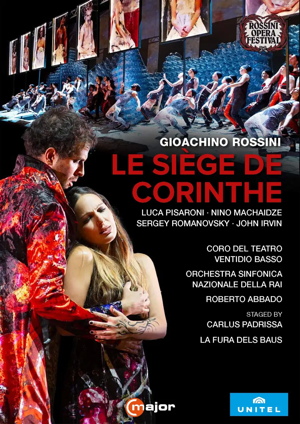
Gioachino Rossini (1792-1868)
Le Siège de Corinthe, Tragédie-lyrique in three acts (1826)
Mahomet II: Luca Pisaroni (bass); Cléomène:John Irvin (tenor); Pamyra: Nino Machaidze (soprano); Néocles: Sergey Romanovsky (tenor); Hiéros: Carlo Cigni (bass); Adraste: Xabier Anduga (tenor); Omar: Iurii Samoilov (baritone); Ismène: Cecilia Molinari (mezzo-soprano)
Coro Teatro Ventido Basso/Giovanni Farina
Orchestra Sinfonica Nazionale della RAI/Roberto Abbado
rec. live, 2017, Adriatic Arena, Pesaro, Italy
C Major 765808 DVD [173]
Le Siège de Corinthe is probably my favorite among the operas that Rossini composed for Paris for its combination of interesting drama and colourful music which had been adapted from Rossini’s earlier 1820 opera seria Maometto Secondo. I have long hoped for a decent video release of Le Siège de Corinthe to be able to enjoy at home. Sadly this rather dreadful production from the Rossini Opera Festival in Pesaro is an almost complete failure in most respects.
The writing was already on the wall when one reads this statement taken from the accompanying booklet: “Reflecting current trends, the set design features piled-up plastic water containers symbolizing the struggle for water, gigantic video instillations and an orchestra pit positioned at stage level.” Just what any of this has to with the Turkish invasion of Greece in 1458 is anyone’s guess. Is it worth my pointing out that water plays no part in the opera’s libretto whatsoever? While I am not opposed to a concept production in theory, one does expect that it will in some way relate to the story of the opera. I could see a concept production which in modern dress highlights the precarious economic position in which Greece has found itself over the last decade. Worked into the opera’s existing struggle of the main characters I could see something like this functioning quite well on stage. What Carlus Padrissa and the Festival administration have provided here is devoid of context and interest, and sinks to a new low point of meaningless regie staging. To make this opera work effectively, the motivation of the characters must be clear. What Padrissa’s production does is to deprive the main characters of any sort of context which sets up the various cultural ties and barriers between them that moves the plot forward. Padrissa has left the singers completely at sea (pun intended) to try to figure out a series of stock movements within this wrongheaded production. The set is made of thousands of empty plastic water bottles lashed together, while not unattractive, is just not specific enough to provide the framework that the action of this story requires. The ugly, paint-splotched costumes do the rest of the sabotage work here; indeed the male members of the cast and chorus look utterly ridiculous in their one-piece outfits. The less mentioned about the ballet the better.
What is left in the rubble of this production is a relatively good cast of singers who give their all to try and make something of this opera in the depressing surroundings. Nino Machaidze uses her distinctively-coloured soprano with great skill to try to make Pamyra’s desperation clear to the audience. Her timbre possesses warmth and some brilliance, and she handles Rossini’s fioratura successfully, although she cannot quite compete with Beverly Sill’s graceful delivery of the same music (despite a voice which was just beginning to decline) on her commercial recording of the Italian version of this opera. Still Machaidze delivers a decidedly heartfelt rendition of “Juste Ciel, ah! Ta clémence”.
Luca Pisaroni is a virile presence as Mahomet. His voice offers tonal luster and he sings in well-enunciated French. Rossini’s coloratura demands (less virtuosic than those for the bass in the original Maometto Secondo) are deftly conquered.
The icing on this cake of vocalists is the presence of two very exciting arrivals in the tenor ranks. Sergey Romanovsky displays a secure technique and a penetrating upper range as the hero Néocles. His account of the main aria “Grand Dieu, faut-il qu’un people” is one of the major accomplishments of this DVD and concedes nothing to Michael Spyres wonderful account on the Naxos CD set of this opera (review). As Cléomène, Pamyra’s father, John Irvin is no less spectacular in his vocal splendor, although he looks much too young to be Nino Machaidze’s father, something that a more appropriate costume and wig might have dealt with appropriately.
Roberto Abbado conducts an impressively agile performance of Rossini’s beautiful score, which is all the more admirable because he is clearly sporting a shoulder immobilizer which indicates that he had undergone shoulder surgery not long before this production was staged. The technical standards of this DVD are in no way disappointing and if anything the vivid picture quality ensures that the dismal pointlessness of Padrissa’s production registers all too clearly.
Mike Parr
Buying this recording via a link below generates revenue for MWI, which helps the site remain free.



Production staff
Stage project: La Furia Dels Baus
Stage director and Set designer: Carlus Padrissa
Scenic Elements, Costume and Video designer: Lita Cabellut
Lighting designer: Fabio Rossi
Video director: Paolo Filippo Berti
Video details
NTSC DVD
Picture format: 16:9 anamorphic
Sound format: LPCM 2.0 and DTS 5.1
Region code: all regions
Subtitles: English, French, German, Japanese, Korean

















